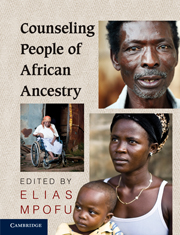Book contents
- Frontmatter
- Contents
- Contributors
- About the Editor
- Editorial Board
- Foreword
- Preface
- Acknowledgments
- PART 1 FOUNDATIONS OF COUNSELING IN AFRICAN SETTINGS
- PART 2 CONTEXTS OF COUNSELING
- PART 3 COUNSELING APPLICATIONS
- 15 Counseling for Trauma
- 16 HIV and AIDS Counseling
- 17 Substance Use Disorder Counseling
- 18 Career Counseling People of African Ancestry
- 19 Counseling People with Disabilities
- PART 4 THE FUTURE OF COUNSELING IN AFRICAN HERITAGE SETTINGS
- Counseling People of African Ancestry Multiple Choice Answers
- Index
19 - Counseling People with Disabilities
Published online by Cambridge University Press: 05 August 2011
- Frontmatter
- Contents
- Contributors
- About the Editor
- Editorial Board
- Foreword
- Preface
- Acknowledgments
- PART 1 FOUNDATIONS OF COUNSELING IN AFRICAN SETTINGS
- PART 2 CONTEXTS OF COUNSELING
- PART 3 COUNSELING APPLICATIONS
- 15 Counseling for Trauma
- 16 HIV and AIDS Counseling
- 17 Substance Use Disorder Counseling
- 18 Career Counseling People of African Ancestry
- 19 Counseling People with Disabilities
- PART 4 THE FUTURE OF COUNSELING IN AFRICAN HERITAGE SETTINGS
- Counseling People of African Ancestry Multiple Choice Answers
- Index
Summary
OVERVIEW. The counseling needs of people with disabilities in African settings have received relatively little attention in the published literature, despite the fact that a majority of Africans, or their families, experience disability in their lifetimes. The disabilities arise mostly from avoidable causes such as inadequate health care systems, civil strife, marginal or failing national economies, and lack of enforcement of disability rights by national governments. This chapter addresses conceptions of disability from an African cultural heritage perspective and counseling interventions to address disability-related needs in those settings. Legal and professional issues that influence the availability of psychosocial services to people with disabilities in sub-Saharan Africa are considered. Counseling enhances health and quality of life in people of African descent with disabilities.
LEARNING OBJECTIVES
By the end of the chapter, the reader should be able to:
Define disability-related terms.
Explain the likely influence of culture on disability identity in an African cultural heritage setting.
Identify and describe the needs in people of African descent with disabilities that counseling services would meet.
Outline the typical counseling interventions that have been used in counseling people with disabilities in African settings and the rationale for their use.
Evaluate the role of community-based approaches in counseling people of African descent with disabilities.
Suggest and discuss ways in which counseling services for African cultural heritage people with disabilities could be enhanced.
- Type
- Chapter
- Information
- Counseling People of African Ancestry , pp. 294 - 310Publisher: Cambridge University PressPrint publication year: 2011
- 4
- Cited by

